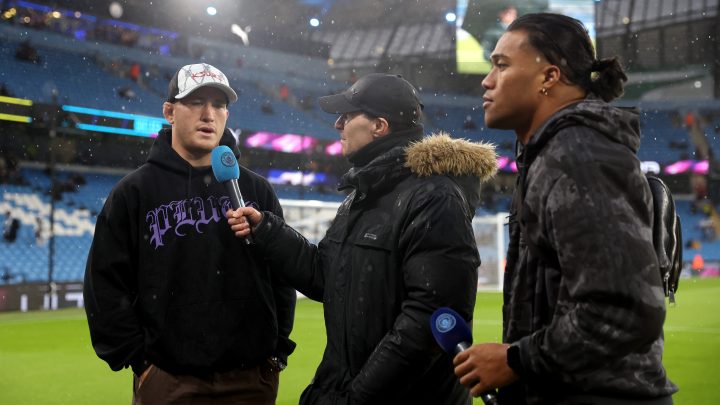
In the golden age of sports content, traditional sports journalism is disappearing
In the golden age of sports content, traditional sports journalism is disappearing

For sports fans, the golden age of content is now. ESPN reported that multiple talk show programs set new viewership records last month. Athletes are producing podcasts and documentaries to give audiences entree behind the scenes. A Deloitte survey shows that around half of Gen Z sports fans use social media to expand their communities while watching live events.
But even with all this new content, traditional sports journalism is slowly disappearing. The New York Times dissolved its sports desk. The Los Angeles Times laid off several sports reporters and stopped day-to-day coverage. Even Sports Illustrated announced mass layoffs, prompting questions about its future.
Sports journalist Keith O’Brien, author of the forthcoming book “Charlie Hustle: The Rise and Fall of Pete Rose, and the Last Glory Days of Baseball,” bemoaned the loss of in-depth sports reporting in an article for The Atlantic. He called the current sports media landscape “troubling and paradoxical,” writing that “despite all of this entertainment, all of these shows, and all of these hot takes, true sports-accountability journalism is disappearing.”
“Marketplace” host Kai Ryssdal spoke with O’Brien about what audiences are missing without in-depth sports reporting. The following is an edited transcript of their conversation.
Kai Ryssdal: There is an incongruity between the hundreds of billions of dollars in the aggregate — I’m sure it’s close to half a trillion or trillion dollars — in sports globally and the austerity that is hitting sports journalism, right? We’re seeing that all the time. And I mentioned that just as a segue into a question about ESPN and the NFL. ESPN, one of the leading sports journalism organizations of the last — I don’t even know how long they’ve been around — 40 years, something like that. They’re now thinking about letting the NFL buy a stake. What does that tell you?
Keith O’Brien: Well, let’s be clear. The NFL and ESPN are already partners. ESPN pays a boatload of money to cover and air games for the NFL. And so those two entities are already partners in almost every way, shape or form. But yeah, I mean, when one of our last remaining lions is in reportedly advanced talks to give an equity stake, an actual stake in its business, to a league that it covers, well, that raises tons of journalistic questions. You don’t need to be a journalist to know that there are a lot of baked-in problems there.
Ryssdal: That actually reminds me of a line in your piece actually, or a passage in your piece where, I think it’s baseball writers, it was a baseball writer you were talking to who said the teams already have such control. And that’s been created by the imbalance in power, right? The dollar value of these teams and the players and the lack of investment on the part of media companies and newspapers specifically, right? The teams now have all the control, and the media has none.
O’Brien: Well, that’s true. And you know, it is also completely different than how it used to be, you know. In the 1960s, ’70s, even into the 1980s, reporters had up-close and personal access to the athletes they covered. They were in the locker rooms and clubhouses on a daily basis. You know, one longtime beat writer I spoke to said that he used to [catch balls during batting practice] on the road when he was covering the Boston Red Sox. That’s how enmeshed he was with the team.
Ryssdal: Which is in and of itself a little troubling, right? Just from a journalism ethics point of view.
O’Brien: Well, right. And it did create problems. I mean, that coziness between sportswriters and athletes did, you know, at times shield us, the public, from the real stories. But it also led to breaking news. It also led to feature stories and investigations because the reporters were there. And when you don’t have the reporters in the room, or in the clubhouse, or on the field, you’re just going to be missing things.
Ryssdal: So in five or 10 years — maybe less, at the rate things are going, right? With the layoffs at the LA Times and the lack of coverage there, and The New York Times and The Athletic and all of that that I talked about in the introduction — how long do we have, do you think, before meaningful sports journalism is gone?
O’Brien: Well, personally, as a journalist, I hope that never happens. But I do fear that the trend lines we’re seeing right now predict a very dark future for, again, in-depth sports journalism. In Chicago, at Northwestern University, there was a massive story. And it was about the suspension of a very popular football coach over vague details about hazing. And what was ultimately unearthed there wasn’t found by professional journalists. It was found by student journalists working at The Daily Northwestern. And so were it not for those student journalists in the room on the campus doing the work, we might never have learned the details of that hazing scandal at Northwestern.
There’s a lot happening in the world. Through it all, Marketplace is here for you.
You rely on Marketplace to break down the world’s events and tell you how it affects you in a fact-based, approachable way. We rely on your financial support to keep making that possible.
Your donation today powers the independent journalism that you rely on. For just $5/month, you can help sustain Marketplace so we can keep reporting on the things that matter to you.

















